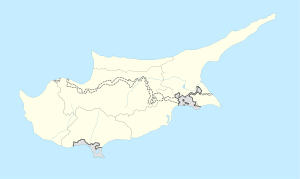Kouklia
| Kouklia | |
|---|---|
| Village | |
| Κούκλια (Greek) Kukla (Turkish) |
|
| Location in Cyprus | |
| Coordinates: 34°41′52″N 32°35′31″E / 34.6978°N 32.5920°ECoordinates: 34°41′52″N 32°35′31″E / 34.6978°N 32.5920°E | |
| Country |
|
| District | Paphos District |
| Government | |
| • Mayor | Michael S. Solonos |
| 669 | |
| Time zone | EET (UTC+2) |
| • Summer (DST) | EEST (UTC+3) |
| Postcode | 8500 |
| Website | www.Kouklia.org.cy |
Kouklia (Greek: Κούκλια Turkish: Kukla) is a village in the Paphos District, about 16 kilometres (9.9 mi) from the city of Paphos on the Mediterranean island of Cyprus. The village is built in the area of "Palaepaphos" (Old Paphos), mythical birthplace of Aphrodite, Greek goddess of love and beauty, which became the centre for her worship in the ancient world.
Remains of the ancient city and the sanctuary can be seen today.
From around 1200 BC, Palaepaphos was a major religious centre famous all over Cyprus, but also thoughout the Mediterranean. Nevertheless it also became a city and seat of power about which still little is known today.
Paphos was also a kingdom and the city was capital of the region.
When the last King of Palaepaphos, Nicocles, moved his capital at the end of the 4th century B.C. to the newly-founded Nea Paphos, some 16 km to the west, the old town retained some of its importance thanks to the continuation of the cult at the temple of Aphrodite. During the Roman period it became the centre of the newly established 'Koinon Kyprion', (the 'Confederation of the Cypriots'), which dealt with religious affairs, the cult of the Roman emperor and controlled the island's bronze coinage.
The Cypriots worshipped a goddess of fertility from as early as the Chalcolithic period (3900–2500 BC). They depicted her as a woman with the obvious characteristics of maternity and modelled figurines of her in stone or clay, of which the larger ones became objects of adoration and their smaller counterparts were worn on the body. Others were placed in graves to protect the dead. The myth that Venus (known as Aphrodite in Greek) was born on the coast of Cyprus may be connected to the adoration of this fertility goddess.
From the 12th century BC onwards, adoration of this goddess becomes particularly resplendent. It appears that before the arrival of Achaeans, Palaepaphos was already a rich city with an ornate holy altar dedicated to the goddess. Tradition holds that King Kinyras of Paphos was both very rich and a priest of Venus. Another legend relates that Agapinoras, king of Tegea and Arcadia, came to Paphos after the Trojan War and founded both the city and the holy altar of Venus. The Greeks, seemingly impressed by the greatness of the goddess of Paphos, built a large altar dedicated to her, parts of which still survive.
...
Wikipedia

